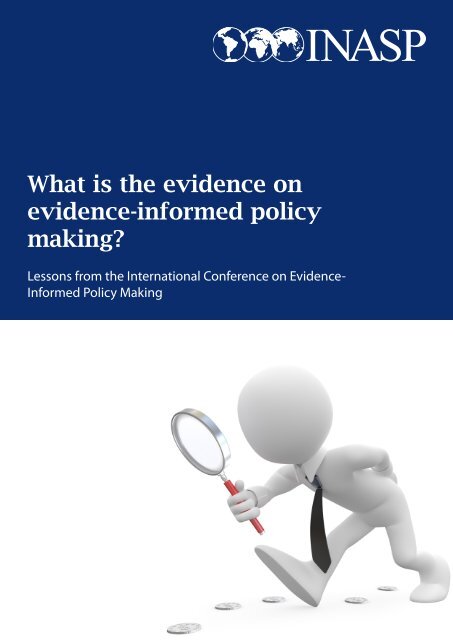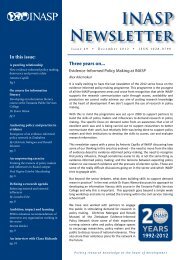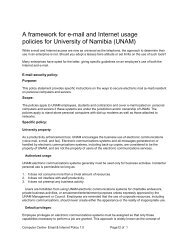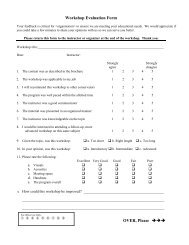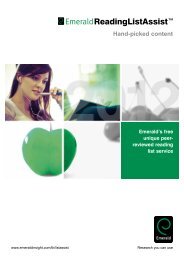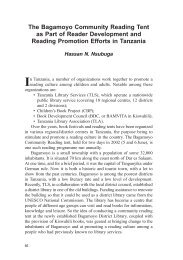What is the evidence on evidence-informed policy making? - INASP
What is the evidence on evidence-informed policy making? - INASP
What is the evidence on evidence-informed policy making? - INASP
You also want an ePaper? Increase the reach of your titles
YUMPU automatically turns print PDFs into web optimized ePapers that Google loves.
<str<strong>on</strong>g>What</str<strong>on</strong>g> <str<strong>on</strong>g>is</str<strong>on</strong>g> <str<strong>on</strong>g>the</str<strong>on</strong>g> <str<strong>on</strong>g>evidence</str<strong>on</strong>g> <strong>on</strong><br />
<str<strong>on</strong>g>evidence</str<strong>on</strong>g>-<strong>informed</strong> <strong>policy</strong><br />
<strong>making</strong><br />
Less<strong>on</strong>s from <str<strong>on</strong>g>the</str<strong>on</strong>g> Internati<strong>on</strong>al C<strong>on</strong>ference <strong>on</strong> Evidence-<br />
Informed Policy Making
Putting research knowledge at <str<strong>on</strong>g>the</str<strong>on</strong>g> heart of development<br />
<strong>INASP</strong> <str<strong>on</strong>g>is</str<strong>on</strong>g> an internati<strong>on</strong>al development organ<str<strong>on</strong>g>is</str<strong>on</strong>g>ati<strong>on</strong> working with a global network of partners to improve<br />
access, producti<strong>on</strong> and use of research informati<strong>on</strong> and knowledge, so that countries are equipped to solve<br />
<str<strong>on</strong>g>the</str<strong>on</strong>g>ir development challenges.<br />
Authors: Kirsty Newman, Ant<strong>on</strong>io Capillo, Akin Famurewa, Chandrika Nath and Willie Siyanbola<br />
Publ<str<strong>on</strong>g>is</str<strong>on</strong>g>hed by:<br />
<strong>INASP</strong><br />
60 St Aldates<br />
Oxford OX1 1ST<br />
United Kingdom<br />
t: +44 (0)1865 249909<br />
f: +44 (0)1865 251060<br />
email: inasp@inasp.info<br />
web: www.inasp.info<br />
Charity No. 1106349<br />
Company No. 04919576<br />
© Internati<strong>on</strong>al Network for <str<strong>on</strong>g>the</str<strong>on</strong>g> Availability of Scientific Publicati<strong>on</strong>s (<strong>INASP</strong>), 2013<br />
<strong>INASP</strong> publicati<strong>on</strong>s terms of use:<br />
The <strong>INASP</strong> m<str<strong>on</strong>g>is</str<strong>on</strong>g>si<strong>on</strong> <str<strong>on</strong>g>is</str<strong>on</strong>g> to enable worldwide access to informati<strong>on</strong> and we, <str<strong>on</strong>g>the</str<strong>on</strong>g>refore, welcome re-use of our<br />
materials for n<strong>on</strong>-commercial purposes. Please credit <strong>INASP</strong> when you download and use our materials.<br />
We publ<str<strong>on</strong>g>is</str<strong>on</strong>g>h under <str<strong>on</strong>g>the</str<strong>on</strong>g> Creative Comm<strong>on</strong>s Attributi<strong>on</strong>-N<strong>on</strong>-Commerical ShareAlike License.<br />
http://creativecomm<strong>on</strong>s.org/licenses/by-nc-sa/3.0
<str<strong>on</strong>g>What</str<strong>on</strong>g> <str<strong>on</strong>g>is</str<strong>on</strong>g> <str<strong>on</strong>g>the</str<strong>on</strong>g> <str<strong>on</strong>g>evidence</str<strong>on</strong>g> <strong>on</strong><br />
<str<strong>on</strong>g>evidence</str<strong>on</strong>g>‐<strong>informed</strong> <strong>policy</strong><br />
<strong>making</strong><br />
Less<strong>on</strong>s from <str<strong>on</strong>g>the</str<strong>on</strong>g> Internati<strong>on</strong>al C<strong>on</strong>ference <strong>on</strong><br />
Evidence‐Informed Policy Making<br />
Kirsty Newman, Ant<strong>on</strong>io Capillo, Akin Famurewa, Chandrika Nath and Willie<br />
Siyanbola*<br />
*Corresp<strong>on</strong>ding author: acapillo@inasp.info. Th<str<strong>on</strong>g>is</str<strong>on</strong>g> paper was written when Kirsty<br />
Newman was Head of Programme for Evidence-Informed Policy Making at <strong>INASP</strong>.
Abstract<br />
In February 2012, over fifty delegates representing eighteen countries and four<br />
c<strong>on</strong>tinents attended <str<strong>on</strong>g>the</str<strong>on</strong>g> Internati<strong>on</strong>al c<strong>on</strong>ference <strong>on</strong> Evidence-Informed Policy<br />
Making in Ile-Ife, Nigeria. The purpose of <str<strong>on</strong>g>the</str<strong>on</strong>g> C<strong>on</strong>ference was to go bey<strong>on</strong>d<br />
anecdote and assumpti<strong>on</strong>s and to focus <strong>on</strong> <str<strong>on</strong>g>the</str<strong>on</strong>g> actual <str<strong>on</strong>g>evidence</str<strong>on</strong>g> <strong>on</strong> <str<strong>on</strong>g>evidence</str<strong>on</strong>g><strong>informed</strong><br />
<strong>policy</strong> <strong>making</strong> (EIPM). During <str<strong>on</strong>g>the</str<strong>on</strong>g> three day c<strong>on</strong>ference, participants<br />
d<str<strong>on</strong>g>is</str<strong>on</strong>g>cussed research which has examined <str<strong>on</strong>g>the</str<strong>on</strong>g> communicati<strong>on</strong> of research to <strong>policy</strong><br />
makers; <str<strong>on</strong>g>the</str<strong>on</strong>g> capacity of <strong>policy</strong> makers to use research; <str<strong>on</strong>g>the</str<strong>on</strong>g> incentives which drive<br />
<strong>policy</strong> makers to use research and much more. The resulting d<str<strong>on</strong>g>is</str<strong>on</strong>g>cussi<strong>on</strong>s were<br />
enlightening and stimulating. The c<strong>on</strong>ference revealed that even am<strong>on</strong>gst those<br />
working in <str<strong>on</strong>g>the</str<strong>on</strong>g> field, <str<strong>on</strong>g>the</str<strong>on</strong>g>re are divergent views <strong>on</strong> what <str<strong>on</strong>g>evidence</str<strong>on</strong>g>-<strong>informed</strong> <strong>policy</strong> <str<strong>on</strong>g>is</str<strong>on</strong>g><br />
and how it relates to <strong>policy</strong> influencing agendas. It also became clear that in some<br />
areas <str<strong>on</strong>g>the</str<strong>on</strong>g>re <str<strong>on</strong>g>is</str<strong>on</strong>g> a lack of robust research <str<strong>on</strong>g>evidence</str<strong>on</strong>g>. In particular, <str<strong>on</strong>g>the</str<strong>on</strong>g>re <str<strong>on</strong>g>is</str<strong>on</strong>g> a shortage of<br />
<str<strong>on</strong>g>evidence</str<strong>on</strong>g> <strong>on</strong> <strong>policy</strong> makers’ actual capacity to use research <str<strong>on</strong>g>evidence</str<strong>on</strong>g> and <str<strong>on</strong>g>the</str<strong>on</strong>g>re <str<strong>on</strong>g>is</str<strong>on</strong>g><br />
even less <str<strong>on</strong>g>evidence</str<strong>on</strong>g> <strong>on</strong> effective strategies to build <strong>policy</strong> makers’ capacity.<br />
Fur<str<strong>on</strong>g>the</str<strong>on</strong>g>rmore, many presentati<strong>on</strong>s highlighted <str<strong>on</strong>g>the</str<strong>on</strong>g> insidious effect of corrupti<strong>on</strong> <strong>on</strong> use<br />
of <str<strong>on</strong>g>evidence</str<strong>on</strong>g> in <strong>policy</strong> <strong>making</strong> processes.<br />
Overall, <str<strong>on</strong>g>the</str<strong>on</strong>g> c<strong>on</strong>ference played an important role in stimulating d<str<strong>on</strong>g>is</str<strong>on</strong>g>cussi<strong>on</strong>s and<br />
highlighting gaps in our current understanding of <str<strong>on</strong>g>evidence</str<strong>on</strong>g>-<strong>informed</strong> <strong>policy</strong> <strong>making</strong>.<br />
It <str<strong>on</strong>g>is</str<strong>on</strong>g> hoped that <str<strong>on</strong>g>the</str<strong>on</strong>g> d<str<strong>on</strong>g>is</str<strong>on</strong>g>cussi<strong>on</strong>s started at <str<strong>on</strong>g>the</str<strong>on</strong>g> c<strong>on</strong>ference will c<strong>on</strong>tinue to influence<br />
<str<strong>on</strong>g>the</str<strong>on</strong>g> practice in th<str<strong>on</strong>g>is</str<strong>on</strong>g> field so that work to support <str<strong>on</strong>g>evidence</str<strong>on</strong>g>-<strong>informed</strong> <strong>policy</strong> <strong>making</strong><br />
itself becomes more <str<strong>on</strong>g>evidence</str<strong>on</strong>g>-<strong>informed</strong>.<br />
Page 1
Introducti<strong>on</strong><br />
Advocates of <str<strong>on</strong>g>evidence</str<strong>on</strong>g>-<strong>informed</strong> <strong>policy</strong> <strong>making</strong> argue that <str<strong>on</strong>g>the</str<strong>on</strong>g> depth and quality of<br />
knowledge used by <strong>policy</strong> makers influence <str<strong>on</strong>g>the</str<strong>on</strong>g> effectiveness of policies. The uptake<br />
of research <str<strong>on</strong>g>evidence</str<strong>on</strong>g> in <str<strong>on</strong>g>the</str<strong>on</strong>g> <strong>policy</strong> <strong>making</strong> process <str<strong>on</strong>g>is</str<strong>on</strong>g> <strong>on</strong> <str<strong>on</strong>g>the</str<strong>on</strong>g> fr<strong>on</strong>t burner of global<br />
d<str<strong>on</strong>g>is</str<strong>on</strong>g>courses <strong>on</strong> approaches and strategies for development. It <str<strong>on</strong>g>is</str<strong>on</strong>g> <str<strong>on</strong>g>the</str<strong>on</strong>g>refore not<br />
surpr<str<strong>on</strong>g>is</str<strong>on</strong>g>ing that internati<strong>on</strong>al development agencies and o<str<strong>on</strong>g>the</str<strong>on</strong>g>r research funders are<br />
placing increasing emphas<str<strong>on</strong>g>is</str<strong>on</strong>g> <strong>on</strong> <str<strong>on</strong>g>the</str<strong>on</strong>g> need to communicate research <str<strong>on</strong>g>evidence</str<strong>on</strong>g> to<br />
<strong>policy</strong> makers. Th<str<strong>on</strong>g>is</str<strong>on</strong>g> has resulted in a flurry of activities aimed at supporting <str<strong>on</strong>g>the</str<strong>on</strong>g><br />
communicati<strong>on</strong> of research <str<strong>on</strong>g>evidence</str<strong>on</strong>g> to <strong>policy</strong> makers.<br />
The Internati<strong>on</strong>al C<strong>on</strong>ference <strong>on</strong> Evidence-Informed Policy Making was held from<br />
<str<strong>on</strong>g>the</str<strong>on</strong>g> 27 th to <str<strong>on</strong>g>the</str<strong>on</strong>g> 29 th of February 2012 in Ile-Ife, Nigeria. The c<strong>on</strong>ference organ<str<strong>on</strong>g>is</str<strong>on</strong>g>ers<br />
aimed to bring toge<str<strong>on</strong>g>the</str<strong>on</strong>g>r researchers who have examined <str<strong>on</strong>g>the</str<strong>on</strong>g> process of <str<strong>on</strong>g>evidence</str<strong>on</strong>g><strong>informed</strong><br />
<strong>policy</strong> <strong>making</strong> as well as representatives of both <str<strong>on</strong>g>the</str<strong>on</strong>g> academic and <strong>policy</strong><br />
<strong>making</strong> communities. The programme of <str<strong>on</strong>g>the</str<strong>on</strong>g> c<strong>on</strong>ference was based <strong>on</strong> <str<strong>on</strong>g>the</str<strong>on</strong>g><br />
Figure 1: Theory of change <strong>on</strong> which programme was based including main sessi<strong>on</strong>s<br />
(shown in speech boxes)<br />
Page 2
organ<str<strong>on</strong>g>is</str<strong>on</strong>g>ers’ <str<strong>on</strong>g>the</str<strong>on</strong>g>ory of change (TOC) related to EIPM. A simplified versi<strong>on</strong> of th<str<strong>on</strong>g>is</str<strong>on</strong>g> <str<strong>on</strong>g>the</str<strong>on</strong>g>ory<br />
of change <str<strong>on</strong>g>is</str<strong>on</strong>g> shown in figure 1 with <str<strong>on</strong>g>the</str<strong>on</strong>g> major c<strong>on</strong>ference sessi<strong>on</strong>s indicated in boxes.<br />
The organ<str<strong>on</strong>g>is</str<strong>on</strong>g>ers accept that th<str<strong>on</strong>g>is</str<strong>on</strong>g> TOC <str<strong>on</strong>g>is</str<strong>on</strong>g> not <str<strong>on</strong>g>the</str<strong>on</strong>g> <strong>on</strong>ly possible <strong>on</strong>e however it reflects<br />
<str<strong>on</strong>g>the</str<strong>on</strong>g>ir understanding of <str<strong>on</strong>g>the</str<strong>on</strong>g> factors which c<strong>on</strong>tribute to <str<strong>on</strong>g>evidence</str<strong>on</strong>g>-<strong>informed</strong> <strong>policy</strong><br />
<strong>making</strong>. It <str<strong>on</strong>g>is</str<strong>on</strong>g> particularly important to note, that th<str<strong>on</strong>g>is</str<strong>on</strong>g> <str<strong>on</strong>g>the</str<strong>on</strong>g>ory of change c<strong>on</strong>siders<br />
factors which affect <str<strong>on</strong>g>the</str<strong>on</strong>g> supply of research informati<strong>on</strong> to <strong>policy</strong> makers and factors<br />
which affect <str<strong>on</strong>g>the</str<strong>on</strong>g> demand for <str<strong>on</strong>g>evidence</str<strong>on</strong>g> from <strong>policy</strong> makers. An explicit aim of <str<strong>on</strong>g>the</str<strong>on</strong>g><br />
c<strong>on</strong>ference was to focus <strong>on</strong> <str<strong>on</strong>g>the</str<strong>on</strong>g> demand for <str<strong>on</strong>g>evidence</str<strong>on</strong>g> from <strong>policy</strong> makers and in<br />
particular <strong>on</strong> <strong>policy</strong> makers’ capacity and incentives to use research.<br />
The d<str<strong>on</strong>g>is</str<strong>on</strong>g>cussi<strong>on</strong>s related to each of <str<strong>on</strong>g>the</str<strong>on</strong>g> sessi<strong>on</strong> topics menti<strong>on</strong>ed in figure 1 are<br />
summar<str<strong>on</strong>g>is</str<strong>on</strong>g>ed below. In additi<strong>on</strong> to <str<strong>on</strong>g>the</str<strong>on</strong>g> sessi<strong>on</strong>s shown in figure 1, <str<strong>on</strong>g>the</str<strong>on</strong>g>re was a sessi<strong>on</strong><br />
<strong>on</strong> capacity building which <str<strong>on</strong>g>is</str<strong>on</strong>g> also summar<str<strong>on</strong>g>is</str<strong>on</strong>g>ed below. In most sessi<strong>on</strong>s, <str<strong>on</strong>g>the</str<strong>on</strong>g><br />
presentati<strong>on</strong>s c<strong>on</strong>tained informati<strong>on</strong> relevant to more than <strong>on</strong>e <str<strong>on</strong>g>the</str<strong>on</strong>g>me and <str<strong>on</strong>g>the</str<strong>on</strong>g>re<br />
were also a number of additi<strong>on</strong>al cross-cutting sessi<strong>on</strong>s (including a highly popular<br />
sessi<strong>on</strong> chaired by <str<strong>on</strong>g>the</str<strong>on</strong>g> Alliance for Health Systems and Policy<br />
Research 1 ).Fur<str<strong>on</strong>g>the</str<strong>on</strong>g>rmore, <str<strong>on</strong>g>the</str<strong>on</strong>g>re was a great deal of lively debate outside of <str<strong>on</strong>g>the</str<strong>on</strong>g><br />
formal programme. Therefore, please note that informati<strong>on</strong> summar<str<strong>on</strong>g>is</str<strong>on</strong>g>ed under each<br />
heading may have been derived from multiple sessi<strong>on</strong>s and o<str<strong>on</strong>g>the</str<strong>on</strong>g>r d<str<strong>on</strong>g>is</str<strong>on</strong>g>cussi<strong>on</strong>s.<br />
Why use research: Examining <strong>policy</strong> makers’ incentives and<br />
motivati<strong>on</strong>s<br />
Various presenters d<str<strong>on</strong>g>is</str<strong>on</strong>g>cussed research which examined <str<strong>on</strong>g>the</str<strong>on</strong>g> incentives and<br />
motivati<strong>on</strong>s which drive <strong>policy</strong> makers to make use of research <str<strong>on</strong>g>evidence</str<strong>on</strong>g>. Perhaps<br />
unsurpr<str<strong>on</strong>g>is</str<strong>on</strong>g>ingly, <str<strong>on</strong>g>the</str<strong>on</strong>g>re was a general c<strong>on</strong>sensus that research <str<strong>on</strong>g>evidence</str<strong>on</strong>g> <str<strong>on</strong>g>is</str<strong>on</strong>g> a relatively<br />
minor factor in most <strong>policy</strong> makers’ dec<str<strong>on</strong>g>is</str<strong>on</strong>g>i<strong>on</strong> <strong>making</strong>.<br />
Kene Onukwube (Nigeria) presented data from a study of 300 stakeholders (from<br />
public sector, private sector, research institutes and <str<strong>on</strong>g>the</str<strong>on</strong>g> community) in South East<br />
Nigeria which examined <str<strong>on</strong>g>the</str<strong>on</strong>g> incentives which drive <strong>policy</strong> makers to make use of<br />
research outputs in envir<strong>on</strong>mental management (Onukwube 2011). H<str<strong>on</strong>g>is</str<strong>on</strong>g> c<strong>on</strong>clusi<strong>on</strong> <str<strong>on</strong>g>is</str<strong>on</strong>g><br />
1 http://www.who.int/alliance-hpsr<br />
Page 3
that ‘political manipulati<strong>on</strong> and ambiti<strong>on</strong> seem to be am<strong>on</strong>g <str<strong>on</strong>g>the</str<strong>on</strong>g> str<strong>on</strong>gest<br />
determinants of factors influencing <strong>policy</strong> development processes’.<br />
A study from Ind<strong>on</strong>esia, presented by Ajoy Datta (UK), showed that research was<br />
used by <strong>policy</strong> makers but <strong>on</strong>ly in certain circumstances (Datta et al. 2011). For<br />
example, both researchers and <strong>policy</strong> makers menti<strong>on</strong>ed that <str<strong>on</strong>g>the</str<strong>on</strong>g>y are more likely to<br />
focus <strong>on</strong> an <str<strong>on</strong>g>is</str<strong>on</strong>g>sue if it has been highlighted as a priority by <str<strong>on</strong>g>the</str<strong>on</strong>g> president. In some<br />
cases, research was used to back up pre-determined <strong>policy</strong> positi<strong>on</strong>s (d<str<strong>on</strong>g>is</str<strong>on</strong>g>cussed<br />
fur<str<strong>on</strong>g>the</str<strong>on</strong>g>r below).Policy makers were also driven by pers<strong>on</strong>al factors including <str<strong>on</strong>g>the</str<strong>on</strong>g>ir own<br />
ethical stance and professi<strong>on</strong>al ambiti<strong>on</strong>. As <strong>on</strong>e d<strong>on</strong>or adv<str<strong>on</strong>g>is</str<strong>on</strong>g>or interviewed by<br />
Datta’s research team stated ‘Even if technocratic or political – it doesn’t matter –<br />
it’s pers<strong>on</strong>ality… it’s 90% pers<strong>on</strong>ality’. Pressure to use research <str<strong>on</strong>g>evidence</str<strong>on</strong>g> could also<br />
come from external actors (including internati<strong>on</strong>al organ<str<strong>on</strong>g>is</str<strong>on</strong>g>ati<strong>on</strong>s) or from <str<strong>on</strong>g>the</str<strong>on</strong>g> public.<br />
The <str<strong>on</strong>g>the</str<strong>on</strong>g>me of public participati<strong>on</strong> in <strong>policy</strong> <strong>making</strong> processes was fur<str<strong>on</strong>g>the</str<strong>on</strong>g>r developed<br />
by Patnam Kumar (India) in h<str<strong>on</strong>g>is</str<strong>on</strong>g> d<str<strong>on</strong>g>is</str<strong>on</strong>g>cussi<strong>on</strong> of genetically modified brinjal (aubergine)<br />
in India. H<str<strong>on</strong>g>is</str<strong>on</strong>g> paper traced <str<strong>on</strong>g>the</str<strong>on</strong>g> h<str<strong>on</strong>g>is</str<strong>on</strong>g>tory of Bt brinjal which was initially approved for use<br />
in India following various biosafety and envir<strong>on</strong>mental tests but was given a<br />
moratorium after widespread c<strong>on</strong>cern was expressed at public c<strong>on</strong>sultati<strong>on</strong><br />
meetings. Patnam believes that public participati<strong>on</strong> <strong>on</strong> science and technology<br />
<str<strong>on</strong>g>is</str<strong>on</strong>g>sues <str<strong>on</strong>g>is</str<strong>on</strong>g> vital and <str<strong>on</strong>g>the</str<strong>on</strong>g> public should be allowed to comment <strong>on</strong> expert assessments.<br />
He c<strong>on</strong>cluded by d<str<strong>on</strong>g>is</str<strong>on</strong>g>cussing <str<strong>on</strong>g>the</str<strong>on</strong>g> new Biotechnology Regulatory Authority Bill of 2011<br />
which appears to have reverse some of <str<strong>on</strong>g>the</str<strong>on</strong>g> previous emphas<str<strong>on</strong>g>is</str<strong>on</strong>g> <strong>on</strong> public<br />
participati<strong>on</strong>. He feels it ‘takes away ‘<str<strong>on</strong>g>the</str<strong>on</strong>g> right to questi<strong>on</strong>’ and shields itself from<br />
being ‘questi<strong>on</strong>ed’’.<br />
The <str<strong>on</strong>g>the</str<strong>on</strong>g>me of incentives and motivati<strong>on</strong>s to use research, and <str<strong>on</strong>g>the</str<strong>on</strong>g> effect of<br />
corrupti<strong>on</strong> and rent-seeking <strong>on</strong> <str<strong>on</strong>g>the</str<strong>on</strong>g>se, emerged frequently during <str<strong>on</strong>g>the</str<strong>on</strong>g> c<strong>on</strong>ference.<br />
One particularly heated debate c<strong>on</strong>cerned <str<strong>on</strong>g>the</str<strong>on</strong>g> frequent requests from <strong>policy</strong><br />
makers for ‘sitting fees’ in order to attend training or seminars which could inform<br />
<str<strong>on</strong>g>the</str<strong>on</strong>g>m about research <str<strong>on</strong>g>is</str<strong>on</strong>g>sues. Participants agreed that th<str<strong>on</strong>g>is</str<strong>on</strong>g> practice <str<strong>on</strong>g>is</str<strong>on</strong>g> widespread in<br />
most of <str<strong>on</strong>g>the</str<strong>on</strong>g> African countries represented; however, opini<strong>on</strong>s <strong>on</strong> how to resp<strong>on</strong>d to<br />
th<str<strong>on</strong>g>is</str<strong>on</strong>g> differed. Some suggested that those who aim to inform <strong>policy</strong> makers about<br />
research need to just accept that paying <str<strong>on</strong>g>the</str<strong>on</strong>g>se fees <str<strong>on</strong>g>is</str<strong>on</strong>g> necessary and should<br />
Page 4
<str<strong>on</strong>g>the</str<strong>on</strong>g>refore include <str<strong>on</strong>g>the</str<strong>on</strong>g>m in <str<strong>on</strong>g>the</str<strong>on</strong>g>ir budgets. However o<str<strong>on</strong>g>the</str<strong>on</strong>g>rs felt that c<strong>on</strong>tinuing to pay<br />
such fees just propagates <str<strong>on</strong>g>the</str<strong>on</strong>g> problem and that those funding research<br />
communicati<strong>on</strong> and uptake work should take a ‘zero-tolerance’ approach. <str<strong>on</strong>g>What</str<strong>on</strong>g><br />
both sides of th<str<strong>on</strong>g>is</str<strong>on</strong>g> argument agreed <strong>on</strong> was that those who aim to support <str<strong>on</strong>g>evidence</str<strong>on</strong>g><strong>informed</strong><br />
<strong>policy</strong> <strong>making</strong> need to acknowledge <str<strong>on</strong>g>the</str<strong>on</strong>g>se <str<strong>on</strong>g>is</str<strong>on</strong>g>sues and decide how <str<strong>on</strong>g>the</str<strong>on</strong>g>y will<br />
resp<strong>on</strong>d to <str<strong>on</strong>g>the</str<strong>on</strong>g>m from <str<strong>on</strong>g>the</str<strong>on</strong>g> outset.<br />
How <str<strong>on</strong>g>evidence</str<strong>on</strong>g>-literate are <strong>policy</strong> makers: Examining <str<strong>on</strong>g>the</str<strong>on</strong>g><br />
knowledge, skills and attitudes of <strong>policy</strong> makers<br />
A large number of presentati<strong>on</strong>s focused <strong>on</strong> <str<strong>on</strong>g>the</str<strong>on</strong>g> capacity (knowledge, skills and<br />
attitudes) of <strong>policy</strong> makers to use <str<strong>on</strong>g>evidence</str<strong>on</strong>g> for <strong>policy</strong> <strong>making</strong>. Presentati<strong>on</strong>s<br />
revealed that at present <str<strong>on</strong>g>the</str<strong>on</strong>g>re <str<strong>on</strong>g>is</str<strong>on</strong>g> ra<str<strong>on</strong>g>the</str<strong>on</strong>g>r little research <str<strong>on</strong>g>evidence</str<strong>on</strong>g> <strong>on</strong> <strong>policy</strong> makers’<br />
ability to use research. Most research in th<str<strong>on</strong>g>is</str<strong>on</strong>g> area has examined <strong>policy</strong> makers’<br />
percepti<strong>on</strong>s of <str<strong>on</strong>g>the</str<strong>on</strong>g>ir own ability and what <str<strong>on</strong>g>the</str<strong>on</strong>g>y need in order to use research and, as<br />
stated by Kirsty Newman (UK) ‘most people d<strong>on</strong>’t know what <str<strong>on</strong>g>the</str<strong>on</strong>g>y d<strong>on</strong>’t know!’.<br />
There <str<strong>on</strong>g>is</str<strong>on</strong>g> however a small body of research which attempts to objectively analyse<br />
<strong>policy</strong> makers’ capacity and, encouragingly, a number of <strong>on</strong>going projects were<br />
presented suggesting that <str<strong>on</strong>g>the</str<strong>on</strong>g> body of research <str<strong>on</strong>g>evidence</str<strong>on</strong>g> will increase in <str<strong>on</strong>g>the</str<strong>on</strong>g><br />
coming years.<br />
Two presentati<strong>on</strong>s focussed <strong>on</strong> parliaments. Fanwell Banda (Zambia) described a<br />
study using an <strong>on</strong>line diagnostic test aimed to assess <str<strong>on</strong>g>the</str<strong>on</strong>g> <str<strong>on</strong>g>evidence</str<strong>on</strong>g>-literacy<br />
(including informati<strong>on</strong> searching skills, understanding of research/science and ability<br />
to extract meaning) of <str<strong>on</strong>g>the</str<strong>on</strong>g> parliamentary staff of Zambia. Participants had all<br />
identified <str<strong>on</strong>g>the</str<strong>on</strong>g>mselves as needing to use research as part of <str<strong>on</strong>g>the</str<strong>on</strong>g>ir job and were<br />
mainly parliamentary researchers or librarians. They scored poorly <strong>on</strong> most areas of<br />
<str<strong>on</strong>g>the</str<strong>on</strong>g> test. For example, <strong>on</strong>ly <strong>on</strong>e in five was able to pick from a l<str<strong>on</strong>g>is</str<strong>on</strong>g>t <str<strong>on</strong>g>the</str<strong>on</strong>g> correct<br />
definiti<strong>on</strong> of a random<str<strong>on</strong>g>is</str<strong>on</strong>g>ed c<strong>on</strong>trolled trial (RCT) while <strong>on</strong>ly <strong>on</strong>e in three believed<br />
<str<strong>on</strong>g>the</str<strong>on</strong>g>re was c<strong>on</strong>sensus that <str<strong>on</strong>g>the</str<strong>on</strong>g> CIA did not invent HIV. Chandrika Nath (UK) presented<br />
findings from a study carried out jointly by <str<strong>on</strong>g>the</str<strong>on</strong>g> Ugandan Parliament, <str<strong>on</strong>g>the</str<strong>on</strong>g> Ugandan<br />
Academy of Science and <str<strong>on</strong>g>the</str<strong>on</strong>g> UK Parliamentary Office of Science and Technology<br />
which examined <str<strong>on</strong>g>the</str<strong>on</strong>g> handling of science and technology <str<strong>on</strong>g>is</str<strong>on</strong>g>sues by <str<strong>on</strong>g>the</str<strong>on</strong>g> Ugandan<br />
Page 5
Parliament (Nath 2011). The study involved expert reviews of research <strong>policy</strong> briefs<br />
(produced by research staff) and of plenary debates <strong>on</strong> science <str<strong>on</strong>g>is</str<strong>on</strong>g>sues. There were<br />
some positive findings, for example some <strong>policy</strong> briefs <strong>on</strong> health <str<strong>on</strong>g>is</str<strong>on</strong>g>sues were<br />
described as ‘fairly well structured’ and ‘impartial’. However, overall <str<strong>on</strong>g>the</str<strong>on</strong>g><br />
understanding and awareness of available research was low. One reviewer<br />
c<strong>on</strong>cluded that ‘many important aspects of a balanced and <str<strong>on</strong>g>evidence</str<strong>on</strong>g> based<br />
d<str<strong>on</strong>g>is</str<strong>on</strong>g>cussi<strong>on</strong> of <str<strong>on</strong>g>the</str<strong>on</strong>g> <str<strong>on</strong>g>is</str<strong>on</strong>g>sues at hand are not addressed’ while ano<str<strong>on</strong>g>the</str<strong>on</strong>g>r stated ‘members<br />
are not clear about what <str<strong>on</strong>g>the</str<strong>on</strong>g> debate <str<strong>on</strong>g>is</str<strong>on</strong>g> about … and …frequently digress to talking<br />
about irrelevant matters’.<br />
A number of participants pointed out that while parliaments, and in particular <str<strong>on</strong>g>the</str<strong>on</strong>g><br />
elected representatives within, are often <str<strong>on</strong>g>the</str<strong>on</strong>g> focus of efforts to d<str<strong>on</strong>g>is</str<strong>on</strong>g>seminate research<br />
findings, <str<strong>on</strong>g>the</str<strong>on</strong>g>y are in fact ra<str<strong>on</strong>g>the</str<strong>on</strong>g>r weak influencers of <strong>policy</strong> in many countries since<br />
<strong>policy</strong> <str<strong>on</strong>g>is</str<strong>on</strong>g> made by <str<strong>on</strong>g>the</str<strong>on</strong>g> executive. Th<str<strong>on</strong>g>is</str<strong>on</strong>g> <strong>policy</strong> <str<strong>on</strong>g>is</str<strong>on</strong>g> officially scrutuin<str<strong>on</strong>g>is</str<strong>on</strong>g>ed by <str<strong>on</strong>g>the</str<strong>on</strong>g> parliament<br />
however, <str<strong>on</strong>g>the</str<strong>on</strong>g> extent to which th<str<strong>on</strong>g>is</str<strong>on</strong>g> happens varies c<strong>on</strong>siderably. Akindele Famurewa<br />
(Nigeria) presented <str<strong>on</strong>g>the</str<strong>on</strong>g> report of a study which looked at both <str<strong>on</strong>g>the</str<strong>on</strong>g> Executive and<br />
<str<strong>on</strong>g>the</str<strong>on</strong>g> Parliament in Nigeria. The study, entitled ‘Evaluati<strong>on</strong> of Sources and Quality of<br />
Science and Technology (S&T) Informati<strong>on</strong> Available to Min<str<strong>on</strong>g>is</str<strong>on</strong>g>try Officials and<br />
Members of <str<strong>on</strong>g>the</str<strong>on</strong>g> Nati<strong>on</strong>al Assembly in Nigeria’ c<strong>on</strong>cluded that both <str<strong>on</strong>g>the</str<strong>on</strong>g> executive<br />
and parliamentary staff report that <str<strong>on</strong>g>the</str<strong>on</strong>g>y rely <strong>on</strong> quality S&T informati<strong>on</strong> in <str<strong>on</strong>g>the</str<strong>on</strong>g><br />
<strong>policy</strong><strong>making</strong> process and have <str<strong>on</strong>g>the</str<strong>on</strong>g> capacity to assess, understand and utilize S&T<br />
informati<strong>on</strong> for effective S&T <strong>policy</strong> <strong>making</strong>. However, <str<strong>on</strong>g>the</str<strong>on</strong>g>re <str<strong>on</strong>g>is</str<strong>on</strong>g> <str<strong>on</strong>g>the</str<strong>on</strong>g> need to streng<str<strong>on</strong>g>the</str<strong>on</strong>g>n<br />
th<str<strong>on</strong>g>is</str<strong>on</strong>g> capacity for improved <strong>policy</strong> formulati<strong>on</strong> and development. Irene Obago<br />
(Kenya), Ignatius Gutsa (Zimbabwe) and Kadenge Lewa (Kenya) d<str<strong>on</strong>g>is</str<strong>on</strong>g>cussed <strong>on</strong>going<br />
studies investigating <str<strong>on</strong>g>the</str<strong>on</strong>g> <str<strong>on</strong>g>evidence</str<strong>on</strong>g>-literacy of individual <strong>policy</strong> makers. Data <str<strong>on</strong>g>is</str<strong>on</strong>g> still<br />
being collected and analysed but preliminary indicators suggest that <str<strong>on</strong>g>the</str<strong>on</strong>g> <strong>policy</strong><br />
makers investigated have low abilities to find, understand and use research.<br />
Ra<str<strong>on</strong>g>the</str<strong>on</strong>g>r than looking at individual <strong>policy</strong> makers, a study presented by Emma<br />
Broadbent (UK) analysed <strong>policy</strong> debates between a range of actors in four countries<br />
(Ghana, Sierra Le<strong>on</strong>e, Uganda, and Zambia). She found that in <str<strong>on</strong>g>the</str<strong>on</strong>g> African c<strong>on</strong>text<br />
research <str<strong>on</strong>g>evidence</str<strong>on</strong>g> <str<strong>on</strong>g>is</str<strong>on</strong>g> ‘not absent’, but that understandings of what c<strong>on</strong>stitute<br />
research <str<strong>on</strong>g>evidence</str<strong>on</strong>g> varies c<strong>on</strong>siderably. Although <str<strong>on</strong>g>the</str<strong>on</strong>g> TOC <strong>on</strong> which <str<strong>on</strong>g>the</str<strong>on</strong>g> c<strong>on</strong>ference<br />
Page 6
programme was based had identified capacity and incentives for <strong>policy</strong> makers to<br />
use research as separate factors, a number of participants highlighted <str<strong>on</strong>g>the</str<strong>on</strong>g><br />
interacti<strong>on</strong>s between <str<strong>on</strong>g>the</str<strong>on</strong>g>se two. For instance, Emma suggested that in some cases,<br />
a lack of capacity to understand research was perceived as beneficial to <strong>policy</strong><br />
makers since it ‘allowed’ <str<strong>on</strong>g>the</str<strong>on</strong>g>m to ignore <str<strong>on</strong>g>evidence</str<strong>on</strong>g> and instead follow <str<strong>on</strong>g>the</str<strong>on</strong>g>ir own<br />
agenda. Thus, <str<strong>on</strong>g>the</str<strong>on</strong>g>re <str<strong>on</strong>g>is</str<strong>on</strong>g> not <strong>on</strong>ly a lack of capacity but also a d<str<strong>on</strong>g>is</str<strong>on</strong>g>incentive to build<br />
capacity.<br />
Ano<str<strong>on</strong>g>the</str<strong>on</strong>g>r participant noted that when senior dec<str<strong>on</strong>g>is</str<strong>on</strong>g>i<strong>on</strong> makers in an instituti<strong>on</strong> lack<br />
capacity to understand research, <str<strong>on</strong>g>the</str<strong>on</strong>g>y are unlikely to value research use and are<br />
<str<strong>on</strong>g>the</str<strong>on</strong>g>refore unlikely to introduce policies which incentiv<str<strong>on</strong>g>is</str<strong>on</strong>g>e <str<strong>on</strong>g>evidence</str<strong>on</strong>g>-<strong>informed</strong> dec<str<strong>on</strong>g>is</str<strong>on</strong>g>i<strong>on</strong><br />
<strong>making</strong>. Additi<strong>on</strong>ally, <str<strong>on</strong>g>the</str<strong>on</strong>g>y may not choose to employ staff who are qualified to<br />
understand research in part because <str<strong>on</strong>g>the</str<strong>on</strong>g>y d<strong>on</strong>’t value research and/or are fearful<br />
to employ staff who are more knowledgeable than <str<strong>on</strong>g>the</str<strong>on</strong>g>y are.<br />
Ano<str<strong>on</strong>g>the</str<strong>on</strong>g>r perspective which emerged during <str<strong>on</strong>g>the</str<strong>on</strong>g> c<strong>on</strong>ference was that low levels of<br />
<str<strong>on</strong>g>evidence</str<strong>on</strong>g>-literacy in <strong>policy</strong> <strong>making</strong> instituti<strong>on</strong>s reflected low levels of <str<strong>on</strong>g>evidence</str<strong>on</strong>g>literacy<br />
more broadly in society. In particular, participants blamed <str<strong>on</strong>g>the</str<strong>on</strong>g> school and<br />
university system for relying <strong>on</strong> outdated teaching approaches and failing to instil a<br />
culture of enquiry in <str<strong>on</strong>g>the</str<strong>on</strong>g>ir students.<br />
Overall, <str<strong>on</strong>g>the</str<strong>on</strong>g> presentati<strong>on</strong>s painted a ra<str<strong>on</strong>g>the</str<strong>on</strong>g>r grim picture of <strong>policy</strong> makers who did not<br />
have <str<strong>on</strong>g>the</str<strong>on</strong>g> necessary skills and knowledge to understand and use research.<br />
Fur<str<strong>on</strong>g>the</str<strong>on</strong>g>rmore, it emerged that <str<strong>on</strong>g>the</str<strong>on</strong>g>re <str<strong>on</strong>g>is</str<strong>on</strong>g> a significant d<str<strong>on</strong>g>is</str<strong>on</strong>g>crepancy between <strong>policy</strong><br />
makers’ perceived ability and <str<strong>on</strong>g>the</str<strong>on</strong>g>ir actual ability in th<str<strong>on</strong>g>is</str<strong>on</strong>g> area. Given that many<br />
instituti<strong>on</strong>s and training providers use self-assessment as a major tool for assessing<br />
capacity, it seems likely that capacity gaps are frequently underestimated.<br />
How well c<strong>on</strong>nected are researchers and <strong>policy</strong> makers:<br />
Examining linkages and networks<br />
Different networking and linking approaches to bring toge<str<strong>on</strong>g>the</str<strong>on</strong>g>r researchers, civil<br />
society and <strong>policy</strong> makers were presented. Such approaches make use of both<br />
virtual and face-to-face networking.<br />
Page 7
Three presentati<strong>on</strong>s c<strong>on</strong>cerned alternative approaches that can be used in order to<br />
c<strong>on</strong>nect <strong>policy</strong> makers, researchers and Civil Society Organ<str<strong>on</strong>g>is</str<strong>on</strong>g>ati<strong>on</strong>s. Julia D’Agostino<br />
(Argentina) d<str<strong>on</strong>g>is</str<strong>on</strong>g>cussed <str<strong>on</strong>g>the</str<strong>on</strong>g> experiences gained over <str<strong>on</strong>g>the</str<strong>on</strong>g> years by <str<strong>on</strong>g>the</str<strong>on</strong>g> Global<br />
Development Network (GDNet) and <str<strong>on</strong>g>the</str<strong>on</strong>g> Center for <str<strong>on</strong>g>the</str<strong>on</strong>g> Implementati<strong>on</strong> of Public<br />
Policies Promoting Equity and Growth (CIPPEC) working with diverse think tanks,<br />
research centres, universities and experts in Latin America, Africa and Asia. Julia<br />
especially highlighted <str<strong>on</strong>g>the</str<strong>on</strong>g> need to generate ‘more synergies’ between different<br />
platforms, to promote <str<strong>on</strong>g>the</str<strong>on</strong>g> use of <str<strong>on</strong>g>evidence</str<strong>on</strong>g> am<strong>on</strong>g <strong>policy</strong> makers, to streng<str<strong>on</strong>g>the</str<strong>on</strong>g>n<br />
researchers’ influencing skills, and to achieve sustainability of linkages.<br />
Michael O’Dwyer (UK) presented an approach implemented by DFID to influence<br />
HIV <strong>policy</strong> for marginal<str<strong>on</strong>g>is</str<strong>on</strong>g>ed groups in Pak<str<strong>on</strong>g>is</str<strong>on</strong>g>tan (Hawkes & Zaheer 2012). Michael<br />
recommended <str<strong>on</strong>g>the</str<strong>on</strong>g> need for involvement of those who were most affected by<br />
policies in advocacy efforts – for example in Pak<str<strong>on</strong>g>is</str<strong>on</strong>g>tan <str<strong>on</strong>g>the</str<strong>on</strong>g>y built <str<strong>on</strong>g>the</str<strong>on</strong>g> capacity of civil<br />
society organ<str<strong>on</strong>g>is</str<strong>on</strong>g>ati<strong>on</strong>s representing marginal<str<strong>on</strong>g>is</str<strong>on</strong>g>ed groups to demand <strong>policy</strong> change.<br />
He also acknowledged that real<str<strong>on</strong>g>is</str<strong>on</strong>g>tic expectati<strong>on</strong>s of research impact should be set –<br />
in particular when research <str<strong>on</strong>g>evidence</str<strong>on</strong>g> <str<strong>on</strong>g>is</str<strong>on</strong>g> ‘competing’ against str<strong>on</strong>g cultural or<br />
religious beliefs. Maria Bar<strong>on</strong> (Argentina) described <str<strong>on</strong>g>the</str<strong>on</strong>g> Fundaci<strong>on</strong> Directorio<br />
Leg<str<strong>on</strong>g>is</str<strong>on</strong>g>lativo’s approach in Argentina, aimed to build an area of c<strong>on</strong>structive dialogue<br />
between <strong>policy</strong> makers and CSOs. Maria calls for a space of informal d<str<strong>on</strong>g>is</str<strong>on</strong>g>cussi<strong>on</strong><br />
am<strong>on</strong>g formal stakeholders.<br />
The remaining presentati<strong>on</strong>s described how linkages and networks develop within<br />
different channels and in different c<strong>on</strong>texts. Hailemichael Taye Beyene (Ethiopia),<br />
whose research <str<strong>on</strong>g>is</str<strong>on</strong>g> still in progress, c<strong>on</strong>sidered <str<strong>on</strong>g>the</str<strong>on</strong>g> role of <str<strong>on</strong>g>evidence</str<strong>on</strong>g> in livestock <strong>policy</strong><br />
<strong>making</strong> in Ethiopia. Hailemichael’s preliminary findings are that <str<strong>on</strong>g>the</str<strong>on</strong>g> linkages am<strong>on</strong>g<br />
actors in <str<strong>on</strong>g>the</str<strong>on</strong>g> livestock development <strong>policy</strong> process in Ethiopia are not str<strong>on</strong>g and<br />
that use of <str<strong>on</strong>g>evidence</str<strong>on</strong>g> in <str<strong>on</strong>g>the</str<strong>on</strong>g> <strong>policy</strong> <strong>making</strong> process <str<strong>on</strong>g>is</str<strong>on</strong>g> at an infant stage. Nnenna<br />
Nwakanma (Nigeria), by analysing <str<strong>on</strong>g>the</str<strong>on</strong>g> c<strong>on</strong>text of Ivory Coast, highlighted how social<br />
media can influence EIPM and c<strong>on</strong>stitute a platform for <str<strong>on</strong>g>the</str<strong>on</strong>g> acti<strong>on</strong> of an active<br />
digital citizenship. Her presentati<strong>on</strong> explored <str<strong>on</strong>g>the</str<strong>on</strong>g> profile of <str<strong>on</strong>g>the</str<strong>on</strong>g>se digital-citizens, <str<strong>on</strong>g>the</str<strong>on</strong>g>ir<br />
<strong>policy</strong> <str<strong>on</strong>g>is</str<strong>on</strong>g>sues and how <str<strong>on</strong>g>the</str<strong>on</strong>g>ir acti<strong>on</strong>s have become a major motivator for <strong>policy</strong><br />
Page 8
makers. Nnenna finally forecasted that social media ‘will serve as an arm of<br />
government’.<br />
During d<str<strong>on</strong>g>is</str<strong>on</strong>g>cussi<strong>on</strong>, participants emphas<str<strong>on</strong>g>is</str<strong>on</strong>g>ed <str<strong>on</strong>g>the</str<strong>on</strong>g> importance <strong>on</strong> including <strong>policy</strong><br />
makers in <str<strong>on</strong>g>the</str<strong>on</strong>g> design phase of research projects. Th<str<strong>on</strong>g>is</str<strong>on</strong>g> strategy was felt to be useful in<br />
tailoring <str<strong>on</strong>g>the</str<strong>on</strong>g> research to <strong>policy</strong> makers needs but also as a means to secure early<br />
‘buy-in’ from <strong>policy</strong> makers so that <str<strong>on</strong>g>the</str<strong>on</strong>g>y were more inclined to c<strong>on</strong>sider results when<br />
<str<strong>on</strong>g>the</str<strong>on</strong>g>y emerged. One participant suggested that <strong>policy</strong> makers can be invited to sit<br />
<strong>on</strong> research adv<str<strong>on</strong>g>is</str<strong>on</strong>g>ory board so that <str<strong>on</strong>g>the</str<strong>on</strong>g>ir input <str<strong>on</strong>g>is</str<strong>on</strong>g> sought throughout <str<strong>on</strong>g>the</str<strong>on</strong>g> research<br />
process.<br />
While <str<strong>on</strong>g>the</str<strong>on</strong>g> early part of <str<strong>on</strong>g>the</str<strong>on</strong>g> c<strong>on</strong>ference analysed <str<strong>on</strong>g>the</str<strong>on</strong>g> demand side of <str<strong>on</strong>g>the</str<strong>on</strong>g> EIPM<br />
process, d<str<strong>on</strong>g>is</str<strong>on</strong>g>cussing <strong>policy</strong> makers’ incentives and capacity to use and understand<br />
research <str<strong>on</strong>g>evidence</str<strong>on</strong>g>, <str<strong>on</strong>g>the</str<strong>on</strong>g> focus of th<str<strong>on</strong>g>is</str<strong>on</strong>g> sessi<strong>on</strong> moved to <str<strong>on</strong>g>the</str<strong>on</strong>g> channels that link research<br />
to <strong>policy</strong> makers. A number of participants commented that networks and linkages,<br />
even when well developed, do not suffice al<strong>on</strong>e to address <str<strong>on</strong>g>the</str<strong>on</strong>g> lack of demand of<br />
research <str<strong>on</strong>g>evidence</str<strong>on</strong>g> from <strong>policy</strong> makers. However, <str<strong>on</strong>g>the</str<strong>on</strong>g>se factors can help to ra<str<strong>on</strong>g>is</str<strong>on</strong>g>e<br />
awareness of research am<strong>on</strong>gst <strong>policy</strong> makers and serve as a c<strong>on</strong>duit for<br />
knowledge flow where <str<strong>on</strong>g>the</str<strong>on</strong>g> demand ex<str<strong>on</strong>g>is</str<strong>on</strong>g>ts.<br />
How well <str<strong>on</strong>g>is</str<strong>on</strong>g> research communicated to <strong>policy</strong> makers: Examining<br />
effective communicati<strong>on</strong> strategies<br />
Th<str<strong>on</strong>g>is</str<strong>on</strong>g> sessi<strong>on</strong> of <str<strong>on</strong>g>the</str<strong>on</strong>g> c<strong>on</strong>ference analysed EIPM from a supply side perspective – that <str<strong>on</strong>g>is</str<strong>on</strong>g><br />
how effectively <str<strong>on</strong>g>is</str<strong>on</strong>g> research packaged and communicated to <strong>policy</strong> makers. In<br />
particular, <str<strong>on</strong>g>the</str<strong>on</strong>g> focus of <str<strong>on</strong>g>the</str<strong>on</strong>g> d<str<strong>on</strong>g>is</str<strong>on</strong>g>cussi<strong>on</strong> was centred <strong>on</strong> <str<strong>on</strong>g>the</str<strong>on</strong>g> role of <str<strong>on</strong>g>the</str<strong>on</strong>g> intermediary<br />
instituti<strong>on</strong>s and how best <str<strong>on</strong>g>the</str<strong>on</strong>g> research can be planned and communicated to<br />
influence <strong>policy</strong> <strong>making</strong>.<br />
Two presentati<strong>on</strong>s focussed <strong>on</strong> models for research/knowledge communicati<strong>on</strong> and<br />
packaging aimed to support EIPM. Jorge Otavio Maia Bareto (Brazil) described <str<strong>on</strong>g>the</str<strong>on</strong>g><br />
activity of <str<strong>on</strong>g>the</str<strong>on</strong>g> Brazilian Piripiri Evidence Centre, which uses research <str<strong>on</strong>g>evidence</str<strong>on</strong>g> to<br />
inform health <strong>policy</strong> and dec<str<strong>on</strong>g>is</str<strong>on</strong>g>i<strong>on</strong> <strong>making</strong> of <str<strong>on</strong>g>the</str<strong>on</strong>g> municipal government of Piripiri. The<br />
Centre’s main outcomes are <str<strong>on</strong>g>evidence</str<strong>on</strong>g> syn<str<strong>on</strong>g>the</str<strong>on</strong>g>s<str<strong>on</strong>g>is</str<strong>on</strong>g>, deliberative dialogues, and <strong>policy</strong><br />
Page 9
iefs, which are communicated by means of digital d<str<strong>on</strong>g>is</str<strong>on</strong>g>seminati<strong>on</strong>. Glowen Kyei-<br />
Mensah (Ghana) analysed <str<strong>on</strong>g>the</str<strong>on</strong>g> activity of Participatory Development Associates<br />
(PDA), a development c<strong>on</strong>sultancy in Ghana, in packaging and communicating<br />
with <strong>policy</strong> makers. In particular, she highlighted <str<strong>on</strong>g>the</str<strong>on</strong>g> Basic Needs programme –<br />
which used a ‘photographic documentary <strong>on</strong> <str<strong>on</strong>g>the</str<strong>on</strong>g> everyday life of people with<br />
mental illness or epilepsy to influence mental health <strong>policy</strong> and practice that<br />
address <str<strong>on</strong>g>the</str<strong>on</strong>g> needs and rights of people with mental illness in Ghana’. To sum up,<br />
Glowen hypo<str<strong>on</strong>g>the</str<strong>on</strong>g>s<str<strong>on</strong>g>is</str<strong>on</strong>g> <str<strong>on</strong>g>is</str<strong>on</strong>g> that photographs of real people suffering from mental illness <str<strong>on</strong>g>is</str<strong>on</strong>g><br />
far more powerful in influencing opini<strong>on</strong>s than any <strong>policy</strong> brief could be.<br />
Debazou Yantio (Camero<strong>on</strong>) presented h<str<strong>on</strong>g>is</str<strong>on</strong>g> research <strong>on</strong> <str<strong>on</strong>g>the</str<strong>on</strong>g> impact that research<br />
findings <strong>on</strong> Water Supply and Sanitati<strong>on</strong> (WSS) had <strong>on</strong> <strong>policy</strong> <strong>making</strong> process in<br />
Camero<strong>on</strong>. The study identified <str<strong>on</strong>g>the</str<strong>on</strong>g> critical factors at play that led to <str<strong>on</strong>g>the</str<strong>on</strong>g> lack of<br />
influence of research <strong>on</strong> <str<strong>on</strong>g>the</str<strong>on</strong>g> WSS <strong>policy</strong> implemented by <strong>policy</strong> makers in <str<strong>on</strong>g>the</str<strong>on</strong>g><br />
country. Debazou proposed some specific recommendati<strong>on</strong>s to ‘<strong>policy</strong><br />
entrepreneurs’ who want to have a significant impact <strong>on</strong> <str<strong>on</strong>g>the</str<strong>on</strong>g> <strong>policy</strong> <strong>making</strong> process<br />
– knowing <str<strong>on</strong>g>the</str<strong>on</strong>g>ir audience; including major stakeholders since <str<strong>on</strong>g>the</str<strong>on</strong>g> beginning of <str<strong>on</strong>g>the</str<strong>on</strong>g><br />
project; setting <strong>policy</strong> influence objectives in <str<strong>on</strong>g>the</str<strong>on</strong>g> research proposal, and choosing<br />
<str<strong>on</strong>g>the</str<strong>on</strong>g> right (strategic) timing for d<str<strong>on</strong>g>is</str<strong>on</strong>g>seminati<strong>on</strong>.<br />
Although <strong>on</strong>e of <str<strong>on</strong>g>the</str<strong>on</strong>g> main objectives of <str<strong>on</strong>g>the</str<strong>on</strong>g> c<strong>on</strong>ference was to re-balance <str<strong>on</strong>g>the</str<strong>on</strong>g><br />
emphas<str<strong>on</strong>g>is</str<strong>on</strong>g> that <str<strong>on</strong>g>is</str<strong>on</strong>g> given <strong>on</strong> <str<strong>on</strong>g>the</str<strong>on</strong>g> supply of research in favour of <str<strong>on</strong>g>the</str<strong>on</strong>g> demand side, <str<strong>on</strong>g>the</str<strong>on</strong>g><br />
organ<str<strong>on</strong>g>is</str<strong>on</strong>g>ers felt it was appropriate to dedicate th<str<strong>on</strong>g>is</str<strong>on</strong>g> entire sessi<strong>on</strong> to approaches to<br />
supply of <str<strong>on</strong>g>evidence</str<strong>on</strong>g>. From <str<strong>on</strong>g>the</str<strong>on</strong>g> presentati<strong>on</strong>s and <str<strong>on</strong>g>the</str<strong>on</strong>g> d<str<strong>on</strong>g>is</str<strong>on</strong>g>cussi<strong>on</strong> generated, three<br />
main <str<strong>on</strong>g>the</str<strong>on</strong>g>mes can be identified <strong>on</strong> how to communicate effectively research and<br />
knowledge for <strong>policy</strong> influence: first, <str<strong>on</strong>g>the</str<strong>on</strong>g> importance that research and knowledge<br />
are produced, packaged and communicated by researchers and intermediaries<br />
who know <str<strong>on</strong>g>the</str<strong>on</strong>g> local c<strong>on</strong>text, needs and capacities of <strong>policy</strong> makers; sec<strong>on</strong>d,<br />
communicati<strong>on</strong> and planning of research and informati<strong>on</strong> require strategic thinking<br />
and appropriate timing; finally, involving <strong>policy</strong> makers in <str<strong>on</strong>g>the</str<strong>on</strong>g> initial planning stages<br />
of research projects increases <str<strong>on</strong>g>the</str<strong>on</strong>g> likelihood of <str<strong>on</strong>g>the</str<strong>on</strong>g> research being used.<br />
Page 10
How <str<strong>on</strong>g>evidence</str<strong>on</strong>g>-based <str<strong>on</strong>g>is</str<strong>on</strong>g> <strong>policy</strong>: Examining <str<strong>on</strong>g>the</str<strong>on</strong>g> extent to which<br />
ex<str<strong>on</strong>g>is</str<strong>on</strong>g>ting <strong>policy</strong> <str<strong>on</strong>g>is</str<strong>on</strong>g> <strong>informed</strong> by <str<strong>on</strong>g>evidence</str<strong>on</strong>g><br />
A number of presentati<strong>on</strong>s examined ex<str<strong>on</strong>g>is</str<strong>on</strong>g>ting policies and examined <str<strong>on</strong>g>the</str<strong>on</strong>g> extent to<br />
which <str<strong>on</strong>g>the</str<strong>on</strong>g>y had been <strong>informed</strong> by research <str<strong>on</strong>g>evidence</str<strong>on</strong>g>.<br />
Martin Obermaier (Germany) explained <str<strong>on</strong>g>the</str<strong>on</strong>g> challenges encountered by <str<strong>on</strong>g>the</str<strong>on</strong>g> Brazilian<br />
Government with regards to climate change adaptati<strong>on</strong> strategic <strong>policy</strong> planning<br />
for specific leg<str<strong>on</strong>g>is</str<strong>on</strong>g>lati<strong>on</strong> and sectorial climate change plans. He compared use of<br />
<str<strong>on</strong>g>evidence</str<strong>on</strong>g> in <strong>policy</strong> <strong>making</strong> to <str<strong>on</strong>g>evidence</str<strong>on</strong>g>-<strong>informed</strong> medicine stating ‘If doctors are<br />
expected to base <str<strong>on</strong>g>the</str<strong>on</strong>g>ir dec<str<strong>on</strong>g>is</str<strong>on</strong>g>i<strong>on</strong>s <strong>on</strong> <str<strong>on</strong>g>the</str<strong>on</strong>g> findings of research surely politicians should<br />
do <str<strong>on</strong>g>the</str<strong>on</strong>g> same’. Martin found that <str<strong>on</strong>g>evidence</str<strong>on</strong>g> was used to inform <strong>policy</strong> dec<str<strong>on</strong>g>is</str<strong>on</strong>g>i<strong>on</strong>s,<br />
however it tended to be limited <strong>on</strong>ly to <str<strong>on</strong>g>is</str<strong>on</strong>g>sues of ec<strong>on</strong>omic impact ra<str<strong>on</strong>g>the</str<strong>on</strong>g>r than <strong>on</strong><br />
‘big picture’ <str<strong>on</strong>g>is</str<strong>on</strong>g>sues related to framing <str<strong>on</strong>g>the</str<strong>on</strong>g> debate and c<strong>on</strong>sidering alternative<br />
opti<strong>on</strong>s. In additi<strong>on</strong>, he noted that <str<strong>on</strong>g>evidence</str<strong>on</strong>g> was often used to back up pre-ex<str<strong>on</strong>g>is</str<strong>on</strong>g>ting<br />
political positi<strong>on</strong>s.<br />
Martin’s findings were str<strong>on</strong>gly echoed in Emma Broadbent’s presentati<strong>on</strong> about use<br />
of <str<strong>on</strong>g>evidence</str<strong>on</strong>g> in African <strong>policy</strong> debates. She found that research played a relatively<br />
minor role in <str<strong>on</strong>g>the</str<strong>on</strong>g> framing of <strong>policy</strong> debates and that <str<strong>on</strong>g>the</str<strong>on</strong>g>re was poor understanding<br />
of <str<strong>on</strong>g>the</str<strong>on</strong>g> differences between research and o<str<strong>on</strong>g>the</str<strong>on</strong>g>r forms of <str<strong>on</strong>g>evidence</str<strong>on</strong>g>. In additi<strong>on</strong>, she<br />
found that research <str<strong>on</strong>g>evidence</str<strong>on</strong>g> was often used to back up pre-defined arguments.<br />
Thus while references to research <str<strong>on</strong>g>evidence</str<strong>on</strong>g> in <strong>policy</strong> debates were quite frequent,<br />
<str<strong>on</strong>g>the</str<strong>on</strong>g> actual role that research played in influencing <strong>policy</strong> was weak.<br />
Ra<str<strong>on</strong>g>the</str<strong>on</strong>g>r than investigating a <strong>policy</strong> formulati<strong>on</strong>, Taofeeq Yekinni (Nigeria) investigated<br />
<str<strong>on</strong>g>the</str<strong>on</strong>g> role that research <str<strong>on</strong>g>evidence</str<strong>on</strong>g> played in <strong>policy</strong> implementati<strong>on</strong>. He focused <strong>on</strong><br />
implementati<strong>on</strong> of agricultural policies in Oyo state of Nigeria. He found that<br />
technocrats implementing <str<strong>on</strong>g>the</str<strong>on</strong>g> <strong>policy</strong> rarely carried out research to assess <str<strong>on</strong>g>the</str<strong>on</strong>g> needs<br />
of farmers. Nei<str<strong>on</strong>g>the</str<strong>on</strong>g>r did <str<strong>on</strong>g>the</str<strong>on</strong>g>y carry out pilot implementati<strong>on</strong> phases to test <str<strong>on</strong>g>the</str<strong>on</strong>g><br />
efficacy of new policies. Th<str<strong>on</strong>g>is</str<strong>on</strong>g> lack of <str<strong>on</strong>g>evidence</str<strong>on</strong>g> c<strong>on</strong>tributed to significant m<str<strong>on</strong>g>is</str<strong>on</strong>g>matches<br />
between <str<strong>on</strong>g>the</str<strong>on</strong>g> priorities identified by farmers and those prioritized by <str<strong>on</strong>g>the</str<strong>on</strong>g> technocrats.<br />
Th<str<strong>on</strong>g>is</str<strong>on</strong>g> situati<strong>on</strong> was exacerbated by high levels of ‘leakage’ of government funds – a<br />
problem identified by both <str<strong>on</strong>g>the</str<strong>on</strong>g> farmers and <str<strong>on</strong>g>the</str<strong>on</strong>g> technocrats <str<strong>on</strong>g>the</str<strong>on</strong>g>mselves.<br />
Page 11
Two <strong>on</strong>going studies examining use of <str<strong>on</strong>g>evidence</str<strong>on</strong>g> in <str<strong>on</strong>g>the</str<strong>on</strong>g> development of a specific<br />
<strong>policy</strong> document were presented. Ng'ang'a Kibandi (Kenya) assessed <str<strong>on</strong>g>the</str<strong>on</strong>g> strength<br />
of research <str<strong>on</strong>g>evidence</str<strong>on</strong>g> called up<strong>on</strong> in <str<strong>on</strong>g>the</str<strong>on</strong>g> process of passing <str<strong>on</strong>g>the</str<strong>on</strong>g> Kenya Biosafety Act<br />
of 2009 by reviewing <str<strong>on</strong>g>the</str<strong>on</strong>g> draft bill and documented minutes of <str<strong>on</strong>g>the</str<strong>on</strong>g> various readings,<br />
committee report and <str<strong>on</strong>g>the</str<strong>on</strong>g> Act. Justice N<strong>on</strong>vign<strong>on</strong> (Ghana) <str<strong>on</strong>g>is</str<strong>on</strong>g> exploring <str<strong>on</strong>g>the</str<strong>on</strong>g><br />
relevance and use of health ec<strong>on</strong>omics research in <str<strong>on</strong>g>the</str<strong>on</strong>g> development of health<br />
policies in Ghana by using <str<strong>on</strong>g>the</str<strong>on</strong>g> Nati<strong>on</strong>al Health Insurance Bill (2011) as a case study.<br />
Both presenters stressed <str<strong>on</strong>g>the</str<strong>on</strong>g> importance of using rigorous processes to assess use of<br />
<str<strong>on</strong>g>evidence</str<strong>on</strong>g> in <strong>policy</strong> <strong>making</strong>.<br />
The debate following <str<strong>on</strong>g>the</str<strong>on</strong>g>se presentati<strong>on</strong>s generated some main trends. It was noted<br />
that research-<str<strong>on</strong>g>evidence</str<strong>on</strong>g> <str<strong>on</strong>g>is</str<strong>on</strong>g> often used opportun<str<strong>on</strong>g>is</str<strong>on</strong>g>tically to back up pre-ex<str<strong>on</strong>g>is</str<strong>on</strong>g>ting<br />
political dec<str<strong>on</strong>g>is</str<strong>on</strong>g>i<strong>on</strong>s/opini<strong>on</strong>s (c<strong>on</strong>firmati<strong>on</strong> bias). Yekinni’s presentati<strong>on</strong> reminded<br />
participants that use of <str<strong>on</strong>g>evidence</str<strong>on</strong>g> <str<strong>on</strong>g>is</str<strong>on</strong>g> not <strong>on</strong>ly important for <str<strong>on</strong>g>the</str<strong>on</strong>g> development of <strong>policy</strong><br />
but also for its implementati<strong>on</strong>. Finally, <str<strong>on</strong>g>the</str<strong>on</strong>g> sessi<strong>on</strong> highlighted <str<strong>on</strong>g>the</str<strong>on</strong>g> need for better<br />
tools and methodologies which could be used to assess <str<strong>on</strong>g>the</str<strong>on</strong>g> extent to which policies<br />
are based <strong>on</strong> <str<strong>on</strong>g>evidence</str<strong>on</strong>g>. The use of expert reviews of <strong>policy</strong> outputs was used in a<br />
number of studies and some fur<str<strong>on</strong>g>the</str<strong>on</strong>g>r development and sharing of th<str<strong>on</strong>g>is</str<strong>on</strong>g> methodology<br />
would be beneficial for <str<strong>on</strong>g>the</str<strong>on</strong>g> community.<br />
Building capacity for <str<strong>on</strong>g>evidence</str<strong>on</strong>g>-<strong>informed</strong> research: Exploring<br />
capacity building strategies to build both <str<strong>on</strong>g>the</str<strong>on</strong>g> supply of and<br />
demand for research<br />
There has been a great deal of interest am<strong>on</strong>gst internati<strong>on</strong>al development d<strong>on</strong>ors<br />
in stimulating demand for research <str<strong>on</strong>g>evidence</str<strong>on</strong>g> by building <str<strong>on</strong>g>the</str<strong>on</strong>g> capacity of <strong>policy</strong><br />
makers to use it however, as yet, few approaches have been implemented and<br />
assessed for impact. The presentati<strong>on</strong>s d<str<strong>on</strong>g>is</str<strong>on</strong>g>cussed below introduced some innovative<br />
programmes for building capacity. There <str<strong>on</strong>g>is</str<strong>on</strong>g> now an urgent need to evaluate <str<strong>on</strong>g>the</str<strong>on</strong>g><br />
effectiveness of such approaches.<br />
Jesse Chigozie Uneke (Nigeria) led a capacity building project which focussed <strong>on</strong><br />
targeted training in relevant skills for <strong>policy</strong> makers of <str<strong>on</strong>g>the</str<strong>on</strong>g> Nigerian state of Eb<strong>on</strong>y<br />
Page 12
(Uneke, Ezeoha, Ndukwe, et al. 2012; Uneke et al. 2011; Uneke, Ezeoha & Ndukwe<br />
2012). They aimed to ‘[enhance] of <strong>policy</strong> makers’ skills and organ<str<strong>on</strong>g>is</str<strong>on</strong>g>ati<strong>on</strong>al capacity<br />
in health <strong>policy</strong> and systems research <str<strong>on</strong>g>evidence</str<strong>on</strong>g> use’. Uneke’s model <str<strong>on</strong>g>is</str<strong>on</strong>g> based <strong>on</strong><br />
shaping <str<strong>on</strong>g>the</str<strong>on</strong>g> training programme and delivery in a c<strong>on</strong>text-related manner. During<br />
<str<strong>on</strong>g>the</str<strong>on</strong>g> preparatory phase, key informant interviews and meetings with <str<strong>on</strong>g>the</str<strong>on</strong>g> <strong>policy</strong><br />
makers served to identify <strong>policy</strong> makers’ needs and perceived capacity c<strong>on</strong>straints.<br />
During <str<strong>on</strong>g>the</str<strong>on</strong>g> sec<strong>on</strong>d phase, questi<strong>on</strong>naires and focus groups were used to identify<br />
specific capacity c<strong>on</strong>straints and formulate a strategy to address <str<strong>on</strong>g>the</str<strong>on</strong>g>m. Finally, six<br />
workshops addressing <str<strong>on</strong>g>the</str<strong>on</strong>g> specific capacity c<strong>on</strong>straints were designed, followed by<br />
evaluati<strong>on</strong> (a pre-workshop assessment questi<strong>on</strong>naire and post-workshop<br />
questi<strong>on</strong>naire were admin<str<strong>on</strong>g>is</str<strong>on</strong>g>tered before and at <str<strong>on</strong>g>the</str<strong>on</strong>g> end of each workshop to<br />
evaluate impact) and a mentorship programme (with senior university lecturers).<br />
Participants at <str<strong>on</strong>g>the</str<strong>on</strong>g> c<strong>on</strong>ference were highly impressed by Uneke’s approach. Many<br />
commented that such a sustained programme of training within a <strong>policy</strong> <strong>making</strong><br />
instituti<strong>on</strong> <str<strong>on</strong>g>is</str<strong>on</strong>g> rare and that Uneke and h<str<strong>on</strong>g>is</str<strong>on</strong>g> team should be commended for achieving<br />
it. Some potential improvements to <str<strong>on</strong>g>the</str<strong>on</strong>g> programme were suggested. Firstly, it was<br />
suggested that Uneke ensures that those training <str<strong>on</strong>g>the</str<strong>on</strong>g> <strong>policy</strong> makers had sufficient<br />
skills in delivery effective training so that <str<strong>on</strong>g>the</str<strong>on</strong>g> programme would achieve maximum<br />
impact. In additi<strong>on</strong>, <str<strong>on</strong>g>the</str<strong>on</strong>g>re was a suggesti<strong>on</strong> that measuring participants’ percepti<strong>on</strong><br />
of <str<strong>on</strong>g>the</str<strong>on</strong>g>ir skills levels would not give an accurate measure of actual skills. Therefore, a<br />
more objective diagnostic test (such as <str<strong>on</strong>g>the</str<strong>on</strong>g> <strong>on</strong>e used by Fanwell Banda in <str<strong>on</strong>g>the</str<strong>on</strong>g><br />
Zambian parliament) could be used.<br />
Nyokabi Ruth Musila presented less<strong>on</strong>s learnt and case studies from programmes of<br />
capacity building of <strong>policy</strong> makers delivered by AFIDEP in Kenya. Their model aimed<br />
to ‘facilitate researcher-<strong>policy</strong> maker linkage and exchange’, using workshops,<br />
c<strong>on</strong>ferences, symposia, and meetings. In order to advocate for <str<strong>on</strong>g>the</str<strong>on</strong>g> use of <str<strong>on</strong>g>evidence</str<strong>on</strong>g><br />
for <strong>policy</strong> am<strong>on</strong>g <strong>policy</strong> makers, she believes that capacity builders need to<br />
understand <str<strong>on</strong>g>the</str<strong>on</strong>g>m and <str<strong>on</strong>g>the</str<strong>on</strong>g>ir priorities including <str<strong>on</strong>g>the</str<strong>on</strong>g>ir political agenda, <str<strong>on</strong>g>the</str<strong>on</strong>g>ir individual<br />
passi<strong>on</strong>s/goals, <str<strong>on</strong>g>the</str<strong>on</strong>g>ir time c<strong>on</strong>straints and <str<strong>on</strong>g>the</str<strong>on</strong>g>ir preoccupati<strong>on</strong> with re-electi<strong>on</strong>.<br />
AFIDEP has found that linking events c<strong>on</strong>tribute to ‘influence percepti<strong>on</strong>s and break<br />
Page 13
stereotypes that researchers and <strong>policy</strong>makers have about each o<str<strong>on</strong>g>the</str<strong>on</strong>g>r, enhance<br />
knowledge and skills of <strong>policy</strong> makers, and influence research priorities’.<br />
While Nyokabi’s presentati<strong>on</strong> highlighted linking across sectors (i.e. researchers and<br />
<strong>policy</strong> makers), Kenneth Oguachuba from Practical Acti<strong>on</strong> Nigeria highlighted a<br />
programme that links similar sectors from different regi<strong>on</strong>s. He <str<strong>on</strong>g>is</str<strong>on</strong>g> involved in <str<strong>on</strong>g>the</str<strong>on</strong>g><br />
Evidences and Less<strong>on</strong>s from Latin America (ELLA) programme, which aims to share<br />
informati<strong>on</strong> about successful <strong>policy</strong> interventi<strong>on</strong>s in Latin America with <strong>policy</strong> makers<br />
in Africa and Asia. Th<str<strong>on</strong>g>is</str<strong>on</strong>g> programme <str<strong>on</strong>g>is</str<strong>on</strong>g> at an early stage but Kenneth was c<strong>on</strong>fident<br />
that south-south partnerships could be an effective mechan<str<strong>on</strong>g>is</str<strong>on</strong>g>m for building<br />
capacity.<br />
Ca<str<strong>on</strong>g>the</str<strong>on</strong>g>rine F<str<strong>on</strong>g>is</str<strong>on</strong>g>her from <str<strong>on</strong>g>the</str<strong>on</strong>g> Institute of Development studies in <str<strong>on</strong>g>the</str<strong>on</strong>g> UK presented a<br />
framework for capacity building efforts which aims to support EIPM. She started by<br />
highlighting that ‘Evidence <strong>informed</strong> <strong>policy</strong> <str<strong>on</strong>g>is</str<strong>on</strong>g> not <str<strong>on</strong>g>the</str<strong>on</strong>g> same as <strong>policy</strong> influence, <str<strong>on</strong>g>the</str<strong>on</strong>g><br />
first implies a change in behaviour/culture, <str<strong>on</strong>g>the</str<strong>on</strong>g> sec<strong>on</strong>d a change in outcome’.<br />
Ca<str<strong>on</strong>g>the</str<strong>on</strong>g>rine presented five mechan<str<strong>on</strong>g>is</str<strong>on</strong>g>ms (adapted from Walter 2005) which can be<br />
used to promote EIPM. The mechan<str<strong>on</strong>g>is</str<strong>on</strong>g>ms are:<br />
1. D<str<strong>on</strong>g>is</str<strong>on</strong>g>seminati<strong>on</strong> of informati<strong>on</strong> (for example by repackaging and aggregating<br />
research informati<strong>on</strong>)<br />
2. Supporting interacti<strong>on</strong>s between researchers and <strong>policy</strong> actors (for example<br />
involving <strong>policy</strong> makers in <str<strong>on</strong>g>the</str<strong>on</strong>g> design phase of research projects)<br />
3. Using social influence (for example influencing public attitudes to research<br />
<str<strong>on</strong>g>evidence</str<strong>on</strong>g> by increasing capacity of media to report <strong>on</strong> research)<br />
4. Prov<str<strong>on</strong>g>is</str<strong>on</strong>g>i<strong>on</strong> of technical, financial, emoti<strong>on</strong>al or organ<str<strong>on</strong>g>is</str<strong>on</strong>g>ati<strong>on</strong>al support (for example<br />
offering training in use of <str<strong>on</strong>g>evidence</str<strong>on</strong>g> to <strong>policy</strong> makers)<br />
5. Reinforcement (for example implementing policies in <strong>policy</strong> <strong>making</strong> instituti<strong>on</strong>s<br />
which mandate use of <str<strong>on</strong>g>evidence</str<strong>on</strong>g>)<br />
For example, Jesse’s project (above) would fit in mechan<str<strong>on</strong>g>is</str<strong>on</strong>g>m 4 while Nyokabi’s<br />
would fit in mechan<str<strong>on</strong>g>is</str<strong>on</strong>g>m 2. Am<strong>on</strong>g her c<strong>on</strong>clusi<strong>on</strong>s, F<str<strong>on</strong>g>is</str<strong>on</strong>g>her acknowledged that ‘big P<br />
politics’ will always be a major driver of <strong>policy</strong> <strong>making</strong> but argued that th<str<strong>on</strong>g>is</str<strong>on</strong>g> should<br />
not inhibit us from striving for increased and improved use of <str<strong>on</strong>g>evidence</str<strong>on</strong>g>. She also<br />
Page 14
pointed out that ‘researchers cannot and should not address all of <str<strong>on</strong>g>the</str<strong>on</strong>g>se <str<strong>on</strong>g>is</str<strong>on</strong>g>sues’ and<br />
ra<str<strong>on</strong>g>the</str<strong>on</strong>g>r she called for those seeking to work in th<str<strong>on</strong>g>is</str<strong>on</strong>g> area to collaborate and share<br />
learning.<br />
Capacity building aimed to build both demand for and supply of <str<strong>on</strong>g>evidence</str<strong>on</strong>g><br />
emerged as crucial tools for having more EIPM. Different models of capacity<br />
building were presented and <str<strong>on</strong>g>the</str<strong>on</strong>g> participants seemed to agree <strong>on</strong> <str<strong>on</strong>g>the</str<strong>on</strong>g> necessity to<br />
balance <str<strong>on</strong>g>the</str<strong>on</strong>g> dominance of supply-driven approaches with complementary<br />
activities to streng<str<strong>on</strong>g>the</str<strong>on</strong>g>n <str<strong>on</strong>g>the</str<strong>on</strong>g> capacity and motivati<strong>on</strong> of <strong>policy</strong> makers to understand<br />
and use research-<str<strong>on</strong>g>evidence</str<strong>on</strong>g> for <strong>policy</strong> <strong>making</strong>.<br />
C<strong>on</strong>clusi<strong>on</strong>s<br />
The presentati<strong>on</strong>s and d<str<strong>on</strong>g>is</str<strong>on</strong>g>cussi<strong>on</strong>s at <str<strong>on</strong>g>the</str<strong>on</strong>g> c<strong>on</strong>ference were rich and varied and it<br />
would be impossible to summar<str<strong>on</strong>g>is</str<strong>on</strong>g>e <str<strong>on</strong>g>the</str<strong>on</strong>g>m all here. Never<str<strong>on</strong>g>the</str<strong>on</strong>g>less, <str<strong>on</strong>g>the</str<strong>on</strong>g>re were a few key<br />
<str<strong>on</strong>g>the</str<strong>on</strong>g>mes which participants seemed to return to and which generated <str<strong>on</strong>g>the</str<strong>on</strong>g> most<br />
d<str<strong>on</strong>g>is</str<strong>on</strong>g>cussi<strong>on</strong>. These <str<strong>on</strong>g>the</str<strong>on</strong>g>mes are summar<str<strong>on</strong>g>is</str<strong>on</strong>g>ed below:<br />
1. Achieving <strong>policy</strong> influence <str<strong>on</strong>g>is</str<strong>on</strong>g> not <str<strong>on</strong>g>the</str<strong>on</strong>g> same as supporting <str<strong>on</strong>g>evidence</str<strong>on</strong>g>-<strong>informed</strong><br />
<strong>policy</strong> <strong>making</strong> – however <str<strong>on</strong>g>the</str<strong>on</strong>g> two are often c<strong>on</strong>flated. Policy influence refers to a<br />
supply-driven model where <str<strong>on</strong>g>the</str<strong>on</strong>g> results of <strong>on</strong>e or more research study are<br />
promoted with <str<strong>on</strong>g>the</str<strong>on</strong>g> aim of achieving some change in <strong>policy</strong> (ranging from<br />
changes in actual written government strategies to changes in <str<strong>on</strong>g>the</str<strong>on</strong>g> language<br />
used in <str<strong>on</strong>g>the</str<strong>on</strong>g> d<str<strong>on</strong>g>is</str<strong>on</strong>g>course; see Weyrauch & Diaz Langou 2011 for more details).<br />
Evidence-<strong>informed</strong> <strong>policy</strong> <strong>making</strong> <strong>on</strong> <str<strong>on</strong>g>the</str<strong>on</strong>g> o<str<strong>on</strong>g>the</str<strong>on</strong>g>r hand requires both supply and<br />
demand for research. It implies a process where a range of research <str<strong>on</strong>g>is</str<strong>on</strong>g><br />
c<strong>on</strong>sidered and understood during <str<strong>on</strong>g>the</str<strong>on</strong>g> <strong>policy</strong> <strong>making</strong> process – al<strong>on</strong>g with o<str<strong>on</strong>g>the</str<strong>on</strong>g>r<br />
forms of <str<strong>on</strong>g>evidence</str<strong>on</strong>g>. There <str<strong>on</strong>g>is</str<strong>on</strong>g> a need for fur<str<strong>on</strong>g>the</str<strong>on</strong>g>r d<str<strong>on</strong>g>is</str<strong>on</strong>g>cussi<strong>on</strong>s and clarificati<strong>on</strong>s <strong>on</strong><br />
<str<strong>on</strong>g>the</str<strong>on</strong>g>se terms 2 .<br />
2. There <str<strong>on</strong>g>is</str<strong>on</strong>g> a tendency for researchers and research intermediaries to focus <str<strong>on</strong>g>the</str<strong>on</strong>g>ir<br />
communicati<strong>on</strong> efforts <strong>on</strong> elected representatives and appointed officials but to<br />
ignore <str<strong>on</strong>g>the</str<strong>on</strong>g> crucial role that technocratic staff play in <strong>making</strong> and influencing<br />
2 These <str<strong>on</strong>g>is</str<strong>on</strong>g>sues will be addressed in a forthcoming publicati<strong>on</strong> in <str<strong>on</strong>g>the</str<strong>on</strong>g> Institute for Development<br />
Studies Bulletin entitled ‘Stimulating demand for research: what <str<strong>on</strong>g>is</str<strong>on</strong>g> it and how do we achieve<br />
it’ authored by Kirsty Newman, Ca<str<strong>on</strong>g>the</str<strong>on</strong>g>rine F<str<strong>on</strong>g>is</str<strong>on</strong>g>her and Lou<str<strong>on</strong>g>is</str<strong>on</strong>g>e Shaxs<strong>on</strong>.<br />
Page 15
<strong>policy</strong>. In additi<strong>on</strong>, <str<strong>on</strong>g>the</str<strong>on</strong>g> functi<strong>on</strong>s of <str<strong>on</strong>g>the</str<strong>on</strong>g> leg<str<strong>on</strong>g>is</str<strong>on</strong>g>lature and <str<strong>on</strong>g>the</str<strong>on</strong>g> executive are<br />
frequently c<strong>on</strong>flated and <str<strong>on</strong>g>the</str<strong>on</strong>g>re <str<strong>on</strong>g>is</str<strong>on</strong>g> relatively little understanding of <str<strong>on</strong>g>the</str<strong>on</strong>g> role that<br />
<str<strong>on</strong>g>evidence</str<strong>on</strong>g> can play in <str<strong>on</strong>g>the</str<strong>on</strong>g> scrutiny process. Those who seek to support <str<strong>on</strong>g>evidence</str<strong>on</strong>g><strong>informed</strong><br />
<strong>policy</strong> <strong>making</strong> need to understand <strong>policy</strong> <strong>making</strong> processes.<br />
3. Supporting effective supply of research to <strong>policy</strong> makers <str<strong>on</strong>g>is</str<strong>on</strong>g> important – but such<br />
efforts will not lead to <str<strong>on</strong>g>evidence</str<strong>on</strong>g>-<strong>informed</strong> <strong>policy</strong> <strong>making</strong> unless <str<strong>on</strong>g>the</str<strong>on</strong>g>re <str<strong>on</strong>g>is</str<strong>on</strong>g> also<br />
demand for research from <strong>policy</strong> makers. Th<str<strong>on</strong>g>is</str<strong>on</strong>g> depends <strong>on</strong> <str<strong>on</strong>g>the</str<strong>on</strong>g>ir incentives to use<br />
research but it also requires that <str<strong>on</strong>g>the</str<strong>on</strong>g>y know what research <str<strong>on</strong>g>is</str<strong>on</strong>g> and how to use it<br />
(i.e. <str<strong>on</strong>g>the</str<strong>on</strong>g>ir capacity). The lack of work <strong>on</strong> <str<strong>on</strong>g>the</str<strong>on</strong>g> demand-side may be due to <str<strong>on</strong>g>the</str<strong>on</strong>g><br />
inherent difficulties of th<str<strong>on</strong>g>is</str<strong>on</strong>g> work – <strong>policy</strong> makers’ are busy and may not be<br />
motivated to build <str<strong>on</strong>g>the</str<strong>on</strong>g>ir own capacity. In additi<strong>on</strong>, <str<strong>on</strong>g>the</str<strong>on</strong>g> expectati<strong>on</strong> am<strong>on</strong>gst<br />
<strong>policy</strong> makers, particularly in Africa, that <str<strong>on</strong>g>the</str<strong>on</strong>g>y will receive payment (in <str<strong>on</strong>g>the</str<strong>on</strong>g> form of<br />
a per diem, h<strong>on</strong>orarium, travel allowance or sitting fee) for attending any training<br />
or learning event can make th<str<strong>on</strong>g>is</str<strong>on</strong>g> work very challenging. There <str<strong>on</strong>g>is</str<strong>on</strong>g> a need to<br />
stimulate <str<strong>on</strong>g>the</str<strong>on</strong>g> demand for research <str<strong>on</strong>g>evidence</str<strong>on</strong>g> from <strong>policy</strong> makers however it<br />
needs to be acknowledged that th<str<strong>on</strong>g>is</str<strong>on</strong>g> <str<strong>on</strong>g>is</str<strong>on</strong>g> difficult work. It <str<strong>on</strong>g>is</str<strong>on</strong>g> <strong>on</strong>ly likely to be<br />
successful if <str<strong>on</strong>g>the</str<strong>on</strong>g>re <str<strong>on</strong>g>is</str<strong>on</strong>g> full ‘buy-in’ from senior dec<str<strong>on</strong>g>is</str<strong>on</strong>g>i<strong>on</strong> makers in <strong>policy</strong> <strong>making</strong><br />
instituti<strong>on</strong>s. Interventi<strong>on</strong>s which are implemented need to be evaluated so that<br />
we know what works.<br />
4. In some cases <str<strong>on</strong>g>the</str<strong>on</strong>g> lack of <str<strong>on</strong>g>evidence</str<strong>on</strong>g>-literacy am<strong>on</strong>gst <strong>policy</strong> makers may be<br />
symptomatic of a poor culture of enquiry in <str<strong>on</strong>g>the</str<strong>on</strong>g> wider society. Some believe that<br />
schools and universities are not instilling critical thinking skills in <str<strong>on</strong>g>the</str<strong>on</strong>g>ir students<br />
(although please note that th<str<strong>on</strong>g>is</str<strong>on</strong>g> was a hypo<str<strong>on</strong>g>the</str<strong>on</strong>g>s<str<strong>on</strong>g>is</str<strong>on</strong>g> which many put forward ra<str<strong>on</strong>g>the</str<strong>on</strong>g>r<br />
than a proven fact). Supporting training of teachers and lecturers so that <str<strong>on</strong>g>the</str<strong>on</strong>g>y<br />
pass <strong>on</strong> a more investigative approach to <str<strong>on</strong>g>the</str<strong>on</strong>g>ir students may be a l<strong>on</strong>g-term<br />
approach to supporting <str<strong>on</strong>g>evidence</str<strong>on</strong>g>-<strong>informed</strong> <strong>policy</strong> <strong>making</strong>.<br />
5. There <str<strong>on</strong>g>is</str<strong>on</strong>g> very little research which objectively examines <strong>policy</strong> makers’ capacity<br />
to use research however that which does ex<str<strong>on</strong>g>is</str<strong>on</strong>g>t reveals poor understanding of<br />
research. Policy makers’ percepti<strong>on</strong> of <str<strong>on</strong>g>the</str<strong>on</strong>g>ir ability to use research <str<strong>on</strong>g>is</str<strong>on</strong>g> markedly<br />
different to <str<strong>on</strong>g>the</str<strong>on</strong>g>ir actual ability. There <str<strong>on</strong>g>is</str<strong>on</strong>g> an urgent need for more research which<br />
evaluates <strong>policy</strong> makers’ capacity to access, understand and use research<br />
<str<strong>on</strong>g>evidence</str<strong>on</strong>g>.<br />
Page 16
6. Research <str<strong>on</strong>g>evidence</str<strong>on</strong>g> <str<strong>on</strong>g>is</str<strong>on</strong>g> frequently cited in <strong>policy</strong> debates however it <str<strong>on</strong>g>is</str<strong>on</strong>g> often used<br />
to back up pre-ex<str<strong>on</strong>g>is</str<strong>on</strong>g>ting political positi<strong>on</strong>s ra<str<strong>on</strong>g>the</str<strong>on</strong>g>r than to truly inform. When<br />
investigating use of research in <strong>policy</strong> <strong>making</strong> it <str<strong>on</strong>g>is</str<strong>on</strong>g> important to understand <str<strong>on</strong>g>the</str<strong>on</strong>g><br />
c<strong>on</strong>text and c<strong>on</strong>sider <str<strong>on</strong>g>the</str<strong>on</strong>g> political and ec<strong>on</strong>omic drivers of dec<str<strong>on</strong>g>is</str<strong>on</strong>g>i<strong>on</strong>s <strong>making</strong>.<br />
Just because a <strong>policy</strong> maker cites research <str<strong>on</strong>g>evidence</str<strong>on</strong>g>, does not mean <str<strong>on</strong>g>the</str<strong>on</strong>g><br />
debate <str<strong>on</strong>g>is</str<strong>on</strong>g> truly <str<strong>on</strong>g>evidence</str<strong>on</strong>g>-<strong>informed</strong>.<br />
7. Corrupti<strong>on</strong> and rent-seeking are pervasive features of many <strong>policy</strong> <strong>making</strong><br />
instituti<strong>on</strong>s. They are str<strong>on</strong>g influencers of <strong>policy</strong> dec<str<strong>on</strong>g>is</str<strong>on</strong>g>i<strong>on</strong>s and thus reduce <str<strong>on</strong>g>the</str<strong>on</strong>g><br />
likelihood of <strong>policy</strong> being based <strong>on</strong> rigorous <str<strong>on</strong>g>evidence</str<strong>on</strong>g>. Programmes which aim to<br />
support <str<strong>on</strong>g>evidence</str<strong>on</strong>g>-<strong>informed</strong> <strong>policy</strong> can ei<str<strong>on</strong>g>the</str<strong>on</strong>g>r ‘go with <str<strong>on</strong>g>the</str<strong>on</strong>g> grain’ (i.e. accept a<br />
degree of corrupti<strong>on</strong> and rent-seeking) or can take a more active anti-corrupti<strong>on</strong><br />
stance. However in both cases it <str<strong>on</strong>g>is</str<strong>on</strong>g> necessary to acknowledge and decide how<br />
to deal with <str<strong>on</strong>g>the</str<strong>on</strong>g>se <str<strong>on</strong>g>is</str<strong>on</strong>g>sues from <str<strong>on</strong>g>the</str<strong>on</strong>g> outset of a project ra<str<strong>on</strong>g>the</str<strong>on</strong>g>r than neglecting to<br />
factor it in.<br />
Acknowledgements<br />
The authors are grateful for <str<strong>on</strong>g>the</str<strong>on</strong>g> helpful comments provided <strong>on</strong> an early draft of th<str<strong>on</strong>g>is</str<strong>on</strong>g><br />
document from Kene Onukwube, Debazou Yantio, Jennifer Obado and Taofeek<br />
Yekinni.<br />
Page 17
Fur<str<strong>on</strong>g>the</str<strong>on</strong>g>r reading<br />
http://www.nacetem.org/events/report_<strong>on</strong>_internati<strong>on</strong>al_c<strong>on</strong>ference.html<br />
www.futurehealthsystems.org/blog/2012/3/16/an-interview-with-dr-kirsty-newmanunderstanding-<str<strong>on</strong>g>evidence</str<strong>on</strong>g>-in.html<br />
http://www.futurehealthsystems.org/blog/2012/3/13/understanding-<str<strong>on</strong>g>the</str<strong>on</strong>g>-<strong>policy</strong>process-reflecti<strong>on</strong>s-from-<str<strong>on</strong>g>the</str<strong>on</strong>g>-intern.html<br />
http://www.impactandlearning.org/2012/04/<strong>policy</strong>-influence-or-<str<strong>on</strong>g>evidence</str<strong>on</strong>g><strong>informed</strong>.html<br />
References<br />
Datta, A. et al., 2011. The political ec<strong>on</strong>omy of <strong>policy</strong>‐<strong>making</strong> in Ind<strong>on</strong>esia: opportunities for<br />
improving <str<strong>on</strong>g>the</str<strong>on</strong>g> demand for and use of knowledge,<br />
Hawkes, S. & Zaheer, H., 2012. Managing research <str<strong>on</strong>g>evidence</str<strong>on</strong>g> to inform acti<strong>on</strong>: Influencing HIV <strong>policy</strong><br />
to protect marginal<str<strong>on</strong>g>is</str<strong>on</strong>g>ed populati<strong>on</strong>s in Pak<str<strong>on</strong>g>is</str<strong>on</strong>g>tan. Global Public ….<br />
Nath, C., 2011. Use of scientific and technological <str<strong>on</strong>g>evidence</str<strong>on</strong>g> within <str<strong>on</strong>g>the</str<strong>on</strong>g> Parliament of Uganda A joint<br />
report by <str<strong>on</strong>g>the</str<strong>on</strong>g> UK Parliamentary Office of Science and Technology, 1 <str<strong>on</strong>g>the</str<strong>on</strong>g> Parliament of Uganda,2<br />
and <str<strong>on</strong>g>the</str<strong>on</strong>g> Ugandan Nati<strong>on</strong>al Academy of Sciences.3 Reviewed and edited with <str<strong>on</strong>g>the</str<strong>on</strong>g> , L<strong>on</strong>d<strong>on</strong>.<br />
Onukwube, K.C., 2011. Streng<str<strong>on</strong>g>the</str<strong>on</strong>g>ning Research ‐ Policy Outputs Linkages in Envir<strong>on</strong>mental<br />
Management in Sou<str<strong>on</strong>g>the</str<strong>on</strong>g>ast Nigeria: A Case study of Anambra, Enugu and Eboyin States, Nigeria.<br />
Uneke, C.J. et al., 2011. Enhancing health <strong>policy</strong>makers’ capacity to use informati<strong>on</strong> and<br />
communicati<strong>on</strong> technology in Nigeria. Journal of Health Informatics in Developing Countries.<br />
Uneke, C.J., Ezeoha, A.E., Ndukwe, C.D., et al., 2012. Promoti<strong>on</strong> of <str<strong>on</strong>g>evidence</str<strong>on</strong>g>‐<strong>informed</strong> health<br />
<strong>policy</strong><strong>making</strong> in Nigeria: bridging <str<strong>on</strong>g>the</str<strong>on</strong>g> gap between researchers and <strong>policy</strong>makers. Global Public<br />
Health.<br />
Uneke, C.J., Ezeoha, A.E. & Ndukwe, C.D., 2012. Enhancing Leadership and Governance<br />
Competencies to Streng<str<strong>on</strong>g>the</str<strong>on</strong>g>n Health Systems in Nigeria: Assessment of Organizati<strong>on</strong>al Human<br />
Resources Development. Healthcare Policy, 7(3).<br />
Walter, I., Nutley, S. & Davies, H., 2005. <str<strong>on</strong>g>What</str<strong>on</strong>g> works to promote <str<strong>on</strong>g>evidence</str<strong>on</strong>g>‐based practice A crosssector<br />
review. Evidence & Policy: A Journal of Research, Debate and Practice, 1(3).<br />
Weyrauch, V. & Diaz Langou, G., 2011. Sound expectati<strong>on</strong>s: from impact evaluati<strong>on</strong>s to <strong>policy</strong><br />
change. Internati<strong>on</strong>al Initiative for Impact Evaluati<strong>on</strong> Working Paper, 12.<br />
Page 18
© Internati<strong>on</strong>al Network for <str<strong>on</strong>g>the</str<strong>on</strong>g> Availability of Scientific Publicati<strong>on</strong>s (<strong>INASP</strong>)<br />
60 St Aldates, Oxford, 0X1 1ST, UK<br />
tel: +44 (0)1865 249 909<br />
fax: +44 (0)1865 251 060<br />
email: inasp@inasp.info<br />
web: http://www.inasp.info


